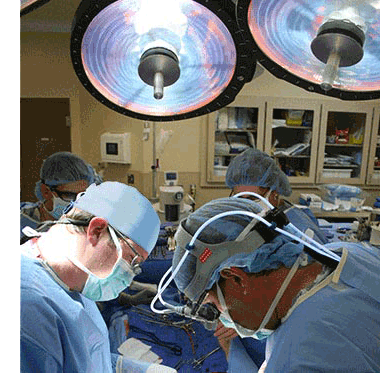 MiMedx has firm footing in the innovation-rich biomedical industry, where new discoveries happen every day.
But at the heart of the Marietta company's success is an age-old concept: shelf-life.
MiMedx has firm footing in the innovation-rich biomedical industry, where new discoveries happen every day.
But at the heart of the Marietta company's success is an age-old concept: shelf-life.
The firm has developed a patented process for dehydrating and reforming human amniotic tissue into wax paper-like sheets or a powder. The dried tissue can be stored at room temperature for years. When the tissue is needed, a doctor can rehydrate it and graft it into wounds, burns, ulcers or other maladies to promote healing or reduce inflammation and scarring, explained MiMedx Chief Executive Officer and Chairman Parker H. "Pete" Petit. "It could even be taken into the battlefield," he said.
The tissue comes from placenta extracted during caesarean-section childbirth. The underlying amniotic tissue is the same as from standard childbirth. But C-section placenta is less likely to be contaminated by blood and other bodily fluids, so it's easier to steralize for reuse.
MiMedx's scientists didn't come up with the concept of using placenta tissue for healing. It has been a part of traditional medicine for centuries and recorded in conventional medical logs for more than a century. Doctors would collect the placenta from the delivery room and bring it to the surgery or recovery wards, where they would place it on patient's wounds.
But the AIDS epidemic of the 1980s and the related fear of tranferring the disease through a tissue graft ended the practice. "It came to a grinding halt. You just couldn't move tissue around like that," said Pete Petit, who has been a health care industry entrepreneur since the 1970s and is a long-time business leader in metro Atlanta's bimedical community. His name adorns a biotech building at Georgia Tech (his alma mater) and a science center at Georgia State (where he earned an MBA).
Eventually, the fear of HIV transmission subsided, and doctors and researchers began to reconsider the benefits of transferring tissue from one point to another. The proprietary science behind MiMedx's key products started with two tissue processors who begain in the 1990s to apply modern processing techniques to placental tissue to create implants. In 2011, their company, Surgical Biologics, was acquired by MiMedx, which already had a distribution system for its own health care products and a seasoned management team, with Petit at the helm.
Since then the company has been on a growth trajectory. Its revenue in the first quarter of this year was $11.6 million - more than three times the #3.7 million it brought in during the same period in 2012. MiMedx has 200 employees, up from 45 employees two years ago. Its tissue grafts have been used in more than 150,000 procedures. That growth earned MiMedx this year's top spot among Atlanta's fastest-growing lower middle-market companies, according to analysis by ACG Atlanta, the local chapter of the Association for Corporate Growth.
Petit calls MiMedx one of the most promising companies of his long entrepreneurial career. But he understands--better than many--about the challenges of growing a company that must pass muster with both U.S. Food and Drug Administration regulations and Medicare reimbursement requirements.
"Health care generally doesn't have to cope with the overall economic issues that affect other kinds of businesses, but regulatory changes can throw health care businesses into a whole new environment overnight," he said.
He's optimistic about MiMedx's continued growth because it sells a cost-effective product. Unlike tissue grafts grown from cells, it does not require the labratory work or the expensive high-tech storage. That will serve the company well when the new health care laws take effect, he predicted.
In addition, MiMedx gets its raw materials donated from "suppliers," the mothers who agree to give their placenta to medical science. It's illegal for human tissue to be sold, so the company's supply line depends on its relationships with about 30 hospitals in Georgia, Florida and Texas. The process allows MiMedx to get information about the donor's medical history--to better ensure there's no disease that could br transferred via the tissue.
And it also allows MiMedx to request the tissue donation at a "joyous" time, Petit said, unlike processors who retrieve tissue from the recently deceased--and must ask their bereaved ralatives for a donation. He said many of the mothers who donate placenta have relatives with diabetic ulcers or other ailments what can be treated using the amniotic tissue, so they're willing to give.
Petit said regulation will be one of the company's challeges going forward. Right now, its proprietary products are based on human tissue, so the efficacy is already proven. But developing new products could require modifying the tissue to create new, unproven products.
"There's more to be done with this tissue," he said, "and to do that we may have to combine it with substances and modify it in ways that will send us through a more extensive FDA process."